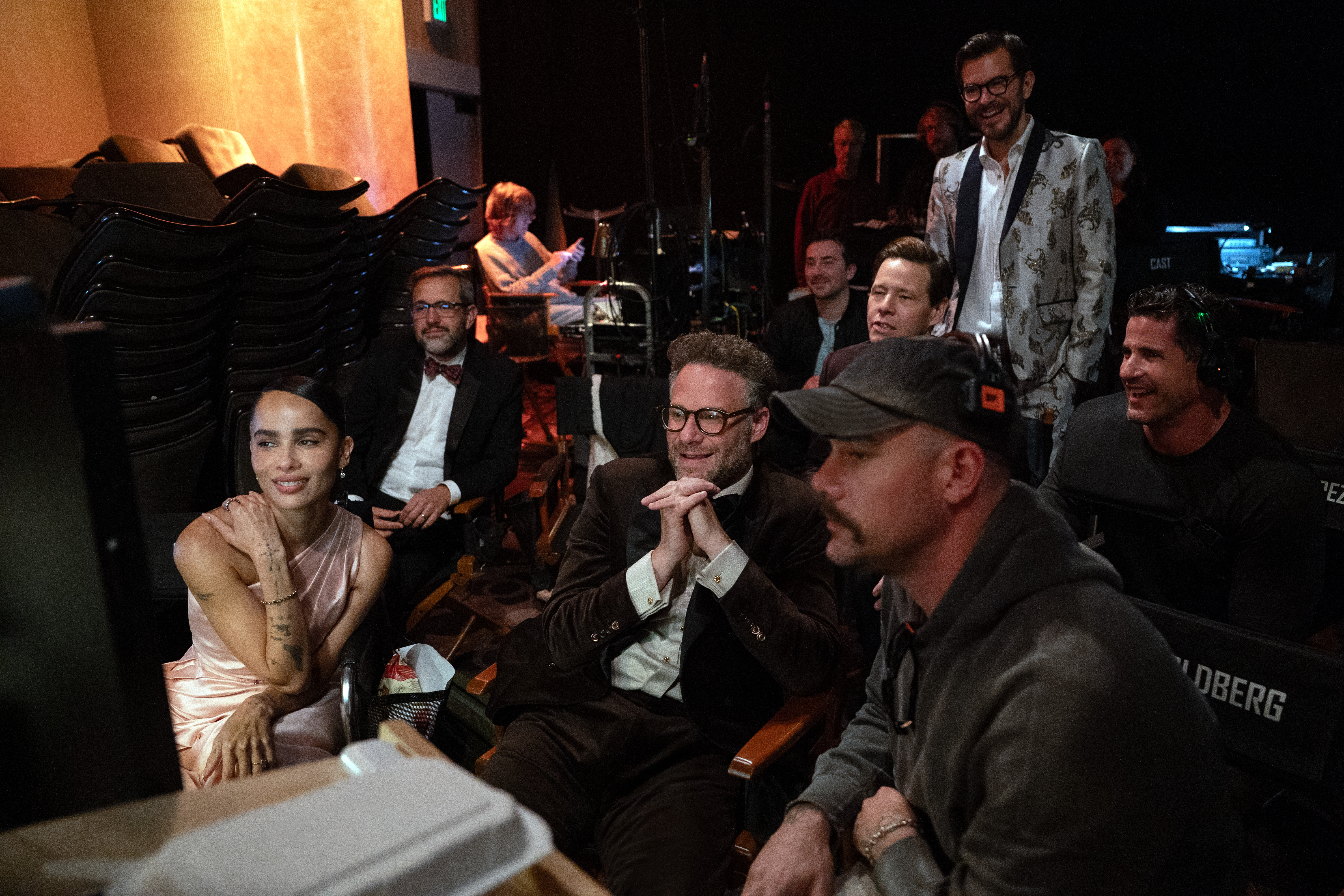AVID ARTIST
ERIC KISSACK, ACE
“Comedy is all about pace and timing.”
EMMY® NOMINATED FOR:
The Studio, “The Promotion”
CATEGORY:
Outstanding Picture Editing (Single Camera) for a Comedy Series
AVID PRODUCTS USED:
Media Composer
FAVORITE AVID TOOLS:
ScriptSync, Animatte, FluidMorph
Editing on the Fly
Editing The Studio was an unusual process. Designed to be these series of long takes, I knew that there'd be little I could do once the footage got to me. So I was on set for all 60 days of the shoot, helping craft the shots. Editing I would normally do in my edit room, I was doing on set, figuring it out on the day.
There was a long five-minute opening sequence that involves the character starting off on the set of a movie, getting in a cart, going into a building which didn't exist, walking up five stairs and going into an office. It was an entire CG (Computer Generated) build. Very elaborate. We shot all pieces, put it together, then realized this part was too slow, and this part needed to be accelerated. We had to reshoot a few pieces and figure out ways to splice them into an already long bit.
Comedy is all about pace and timing. You pick the best version, but you're always thinking, ‘I wish I could trim that moment, take out that breath or jump this joke.’ Being on set, my job was to do that in the moment. I would huddle with the directors and say, ‘I think this moment needs to be sped up. This joke, is it that funny?’ It was terrifying to say that to Seth Rogen and Evan Goldberg. But they were open to suggestions. It was a fun collaborative process with me, Seth, Evan and the camera team.
Designing Edits in Real Time
It didn't seem immediately obvious how we could combine these best bits. We would craft these camera moves in the scene based around where the improv was going to happen.
So if we knew that on this line, Kathryn Hahn is going to do something crazy and brilliant, we would design a camera move that would allow us to cut between takes. Our camera operator, Mark, a genius, would get his choreography down so perfectly that he would always be in the same position, the same part in the scene, and would move the camera in the same way so that we could change takes on those moves. We would block the scene, then I would go through the script and identify moments where improv would happen. We would design camera moves to allow us to change between takes for each improv hole. It was exciting, crazy and drove the camera operator crazy because he was having to remember all the moves and change it on the fly. But it worked.
Media Composer is at the heart of everything I do. I'm so quick and fluid with it, which was helpful because I spent 10 hours a day on set and would squeeze in an hour in the edit room in the morning assembling pieces we had crafted the day before. Because Media Composer has the ScriptSync tool, it enabled me to quickly jump to pieces I needed and click them together. I love working straight from the script. It allows you to see different takes. You can do a complete run of those and have it all right there in the script. We use FluidMorph to speed up moments. Jason Brotman, one of my incredible assistants, is a genius with the Animatte tool and he was able to do wonderful work in the edit to stitch together some of these shots.
Half the shoot happened at Warner Brothers, where I had an office close by to set I could run to when I needed to edit. Half the show was on location, and I didn't have easy access to my Avid. I remember calling up Mike Manning, my post-super and saying, is there any way we can get a laptop so I can be on set and not fall behind? The next day there's a room next to set where a standing desk has appeared with a full Avid.
The next episode we shot was at the Beverly Hilton. I walk backstage and there's a standing desk with my Avid. I showed up in Vegas where we shot the last few episodes and there was a suite at the Venetian with my Avid standing desk. I loved having that access and ability.
I think of comedy editing as juggling multiple balls. There are jokes because you want people to laugh. There's character work. You want people to care about the characters and be engaged. There's plot, what we're trying to do in every scene.
The trick is balancing those balls and making sure they don't get dropped. Sometimes a joke that's hilarious might make a character unlikable or confuse what is happening. We're constantly balancing those things, especially on a show like The Studio where it takes place in this world with a lot of insider knowledge. People who work in the business, they get it. But we wanted to design the show for everyone. The idea was even if you don't understand some of the lingo, you understand enough about what they're trying to do that you're engaged.

Eric Kissack with the directors and cast behind the scenes of The Studio
From Set to Spotlight
Being on set every day for 60 days, helping craft these long takes while still having them be dynamic, exciting and funny was a giant challenge. I've never done anything like it. I hope to do more of it soon.
Getting an Emmy nomination feels wonderful. My favorite thing about this work is being part of a community that I love and respect. And the fact that the community acknowledged this and acknowledged me is really wonderful.
Prague to Primetime
I did a semester abroad in college at the Film Academy in Prague. I shot a short film in the main Prague train station in winter. We were outside for a week in the cold and we all got sick. I remember going to bed for two days, coming out of it and making my way to the edit room. It was part of my healing process physically to be in this warm, comfortable room, but also mentally being in a place where I could think, be calm and do my best work.
When I first started as an editor I knew I needed to learn Media Composer. Summer of 2004, I got a call from The Daily Show. Every other editor in town was in the Hamptons or something. I was excited, but I didn't know Avid. I ran to Barnes & Noble and bought “Avid for Dummies.”
I threw it in my bag, and thought, ‘I'm going to be fine.’ I go in, and I'm working on an interview with Ed Helms. It's going well, because I know enough about editing that I'm figuring it out. Then a producer says, ‘Can you add this Chyron over the scene?’ I'm like, great. ‘Yep, no problem. I'm going to run to the bathroom.’ I run to the bathroom with my bag, sit in the stall, and look up how to do graphics layered Chyrons. I go back and say, ‘No problem. Here's your Chyron.’ He's like, ‘Now, do you mind doing a little test audio output of this?’ I'm like, ‘Yep, no problem. Just going to the bathroom again.’ Ran to the bathroom, grabbed my bag, looked it up, came back. It happened three more times. Finally, this producer was like, ‘Are you OK? Do you need Pepto Bismol or something?’ I was like, ‘Nope. Maybe something I ate. I'm fine.’ The first two days I was in a white-hot sweat. But I figured out enough of the Avid to edit on The Daily Show for a month.
An editor's job is to bring out the truest interpretation of a script or a director's vision. My favorite thing is getting to work with talented actors, directors, writers, camera crews, visual effects people, sound, this constellation of talents. The editor gets to touch it all. It's amazing to go into a color bay and see your work with a new shade or go into the sound mix and see incredible people making it sound rich and full. The editor is at the center. It's great to be part of that process.
Trust the Process
Editing gets easier the more you do it. The first few things I worked on, especially features, I was so stressed out because every time I was solving new problems and thought, ‘Oh, God, this is the rest of my life. I'll be stressed all the time.’ Eventually, things start clicking. You think, ‘I've seen this before. I know how to solve this problem.’ It's not like it becomes an easy job, but it becomes something where I can lean on my experience.
I've edited exclusively on Media Composer. If you don't know Media Composer, you're at a disadvantage. Everyone should learn it.
About the Editor
Eric Kissack, ACE, has edited such films as Role Models, Brüno, Cedar Rapids, The Dictator, Horrible Bosses 2, Daddy’s Home, Instant Family, Barb & Star Go to Vista Del Mar and Bottoms. He has worked in television editing Black Monday, Rutherford Falls, Pam & Tommy and The Studio among other shows. In addition to his Emmy nomination for The Studio, he was also nominated for Emmys for his work on Veep and The Good Place. He just finished editing a new television show for Amazon based on the Spider-Noir character starring Nicolas Cage. It premieres in 2026. Kissack studied film at Brown University.
Email Preferences | © 2025 Avid Technology, Inc. | Terms & Legal | Privacy

